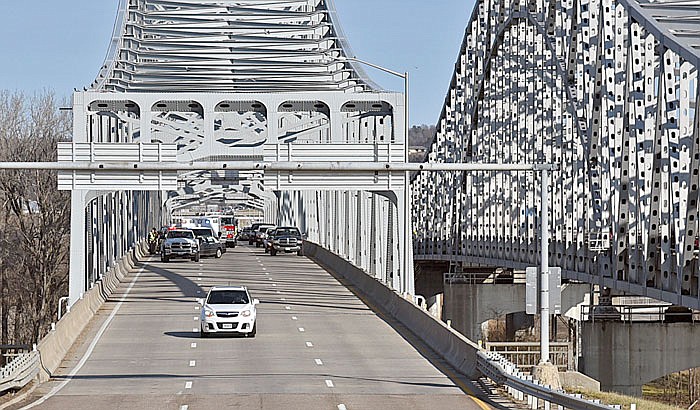For the second time in six years, the American Society of Civil Engineers gave Missouri a grade of C- on its infrastructure report card.
During a news conference Thursday at the state Capitol, representatives from the group said Missouri's roads, energy infrastructure and dams are in dire shape.
The ASCE represents more than 150,000 civil engineers in 177 countries. When the ASCE first released an infrastructure report card for Missouri in 2013, the state also earned a C-. The C- the group gave the state this year sits a sliver above the D+ the group gave the United States last year.
"Missouri's infrastructure continues to run along at the status quo," said Sheryl Gallagher, chair of ASCE's Missouri Infrastructure Report Card Committee. "With no increase in investment soon, we'll start feeling the ramifications."
Of the 11 categories ASCE evaluated, no category earned a grade higher than C. No category earned a grade of F.
At D-, dam infrastructure got the lowest grade. The report said 1,123 unregulated high-hazard dams statewide do not report their physical condition to the state of Missouri. Their failure could cause significant loss of property and life, the report said.
Energy infrastructure earned a grade of D+ from the group. The ASCE said 79 percent of Missouri's energy is produced by coal power plants and 12 percent is produced through nuclear energy. Aging energy infrastructure continues to be a large expense for the energy system, the report said.
Bridges and roads earned grades of C and D+ from the group. Statewide, 12.9 percent of bridges are structurally deficient, compared to 8.9 percent nationwide. The report commended the Missouri Department of Transportation for repairing more than 800 bridges from 2009-13 with limited funding. Still, the report notes the state has 4,800 bridges that need repairs totaling $4.2 billion.
Missouri has a 34,000-mile highway network, the seventh largest in the country. Since the General Assembly last raised its fuels tax to 17 cents per gallon in 1996, the tax lost about half of its purchasing power.
State Rep. Kevin Corlew, R-Kansas City, chaired the Missouri 21st Century Transportation Task Force last year. The task force issued a report in January that recommended increasing the state's gasoline tax by 10 cents per gallon and diesel fuel tax by 12 cents per gallon. The report said this would give the fuels tax the same purchasing power it had in 1996 and inject $2.6 billion into funding for road improvements.
Corlew told the News Tribune he's cautiously optimistic one of the nine transportation funding bills in the House and Senate can pass before the legislative session ends in mid-May.
"We have some matters that are taking precedence," Corlew said. "But there's still a sincere interest and a desire for members of the Legislature to get something done in terms of increasing our transportation investment."
MoDOT Director Patrick McKenna said in February that the department faces a shortfall of $825 million per year. This prevents the department from working on projects it wants to work on, like rebuilding Interstate 70.
"We have been basically in maintenance mode," Corlew said. "So we haven't been able to expand the system, but the revenue simply isn't there."
In January, the U.S. Chamber of Commerce outlined a proposal to raise the federal fuel usage tax by 25 cents to 49.4 cents per gallon of gasoline. He supports efforts to increase the amount of federal money available to fund road improvements but noted most federal grants require state contributions to projects.
Corlew said members of his generation must update a highway system that his grandparents' generation created. Some highways built in the 1950s were designed to last 20 years and are still in operation, the 21st Century Task Force report noted. The grades given for roads and bridges by the ASCE simply are not adequate, he added.
"That's not good enough for the safety of Missouri citizens," he said. "It's not good enough to have the kind of economy we need that involves an integrated transportation system."

